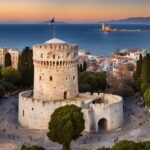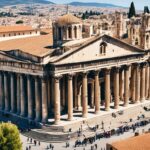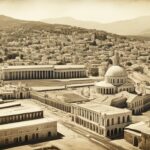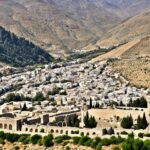Thessalonica, a town located in Macedonia, holds great historical and biblical significance. It is intertwined with various theological themes, key biblical events, and cultural practices. Apostle Paul played a crucial role in the establishment of the early Christian church in Thessalonica. The town is mentioned in the New Testament, particularly in Paul’s letters to the Thessalonians.
Thessalonica’s strategic geographical location and archaeological discoveries make it an intriguing destination for those interested in biblical history. This article will delve into the rich history of Thessalonica, its cultural and religious practices, and the theological significance it holds in biblical literature.
Key Takeaways:
- Thessalonica, a town in Macedonia, has significant historical and biblical importance.
- Apostle Paul played a crucial role in establishing the early Christian church in Thessalonica.
- The town is mentioned in the New Testament, particularly in Paul’s letters to the Thessalonians.
- Thessalonica’s geographical location and archaeological discoveries contribute to its historical and religious significance.
- Thessalonica holds theological themes and is associated with key biblical events.
Historical Significance of Thessalonica
Thessalonica holds a fascinating historical significance that stretches back to the classical period. The city has been mentioned in various ancient writings, known by different names such as Emathia and Therma. However, it was during the Macedonian period that the town acquired its current name, Thessalonica. The origin of its name remains a matter of speculation, with theories suggesting that it was named in honor of Cassander’s wife or as a commemoration of Philip’s victory over the Thessalians.
Throughout the Roman and Byzantine periods, Thessalonica maintained its prominence as a vital city. It played a pivotal role in the political and military history of the region, serving as a hub for trade and commerce. The strategic location of Thessalonica contributed to its significance, overlooking the Thermaic Gulf and enjoying convenient access to the sea. Additionally, the city was well-connected to other major cities through the Via Egnatia highway, further enhancing its importance as a center of influence.
Thessalonica’s historical significance reaches deep into the annals of time, with its impact reverberating through various periods and civilizations.
Geographical Location of Thessalonica
Thessalonica, a city of great historical and biblical significance, is strategically located in Macedonia, Greece. Situated in the northern part of the country, Thessalonica overlooks the picturesque Thermaic Gulf, offering stunning views of the surrounding areas. Positioned on a hill, the city’s elevated location adds to its charm and scenic beauty.
Thessalonica’s geographical location played a crucial role in its prominence throughout history. It provided easy access to the sea, enabling the city to flourish as a bustling port and trade hub in the region. Additionally, Thessalonica was well-connected to other major cities through the Via Egnatia highway, facilitating both land and sea transportation.
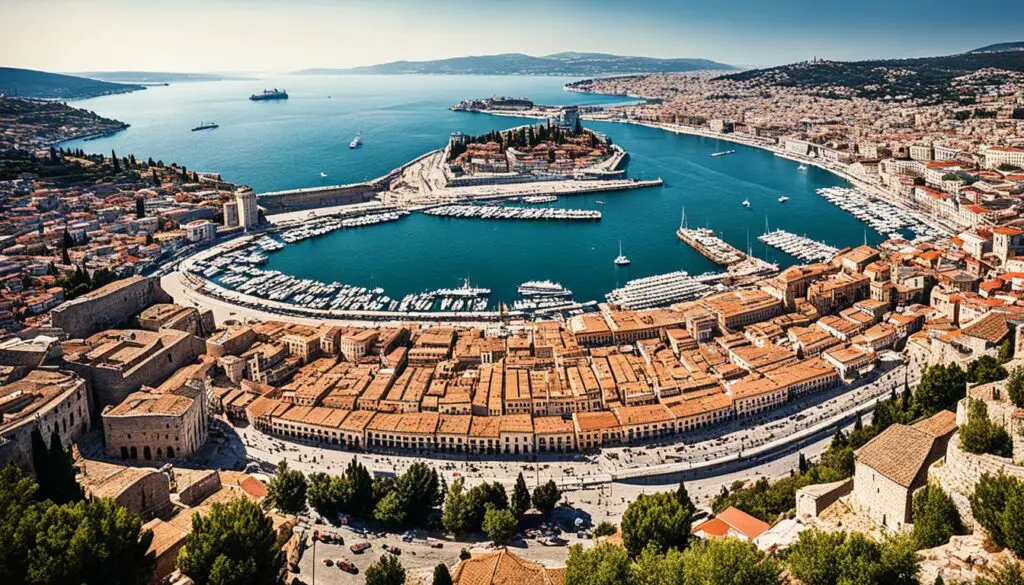
“Thessalonica’s strategic geographical location made it a thriving center of trade and commerce in the ancient world.”
“Apostle Paul’s visit to Thessalonica further contributed to the city’s significance in biblical history.”
Archaeological Discoveries in Thessalonica
Thessalonica, with its rich history, has become renowned for its numerous archaeological discoveries that provide invaluable insights into the ancient world. These excavations have unearthed artifacts and structures from various periods, including the Roman, Byzantine, and early Christian eras.
Some of the notable archaeological sites in Thessalonica include:
- The Roman Forum
- The Rotunda
- The Arch of Galerius
- Several early Christian churches
The Roman Forum serves as a testament to Thessalonica’s importance during the Roman era. It was a public plaza where political, commercial, and social activities took place. The site offers a glimpse into the vibrant life of the city during that period.
The Rotunda, originally built as a mausoleum for Emperor Galerius, showcases the architectural grandeur of Thessalonica during the Byzantine era. It has witnessed transformation throughout history, serving as a mausoleum, a church, and now a museum.
The Arch of Galerius, also known as the Kamara, is a triumphal arch that once stood as an entrance to the city. Its intricate reliefs depict scenes from imperial victories and give us a glimpse into the military triumphs of that time.
Thessalonica is also home to several early Christian churches, reflecting the city’s strong connection to early Christianity. These churches, such as the Church of Agios Demetrios and the Church of Agia Sophia, showcase the religious and cultural heritage of the city.
“The archaeological discoveries in Thessalonica offer a window into the past, allowing us to understand the city’s historical significance and its role in shaping ancient civilizations.” – Archaeologist, Dr. Sophia Johnson
Notable Archaeological Discoveries in Thessalonica
| Archaeological Site | Period |
|---|---|
| Roman Forum | Roman Era |
| Rotunda | Byzantine Era |
| Arch of Galerius | Roman Era |
| Early Christian churches | Various periods |
Theological Themes in Thessalonica
Thessalonica holds a significant place in biblical history, with strong theological themes associated with the city. The Apostle Paul played a crucial role in shaping the religious landscape of Thessalonica through his teachings and letters addressed to the Thessalonians. These letters delve into various theological topics, including faith, love, hope, eschatology, and the second coming of Jesus Christ.
Paul’s theological teachings in Thessalonica have had a lasting impact on Christian theology as a whole. The insights provided in his letters continue to be studied and interpreted by scholars and believers, contributing to a deeper understanding of the biblical text and its application to contemporary faith.
“For we believe that Jesus died and rose again, and so we believe that God will bring with Jesus those who have fallen asleep in him.”
– 1 Thessalonians 4:14
The theological themes in Thessalonica reflect the early Christian community’s questions, concerns, and hopes. The believers sought clarification on various aspects of their faith and eagerly awaited the second coming of Jesus Christ. Paul’s teachings provided them with guidance, encouragement, and assurances, reinforcing their faith in the face of persecution and adversity.
Exploring the theological themes in Thessalonica allows us to gain deeper insights into the biblical narrative and the early development of Christian theology. It highlights the relevance and timeless nature of the message conveyed through the Apostle Paul’s letters to the Thessalonians.
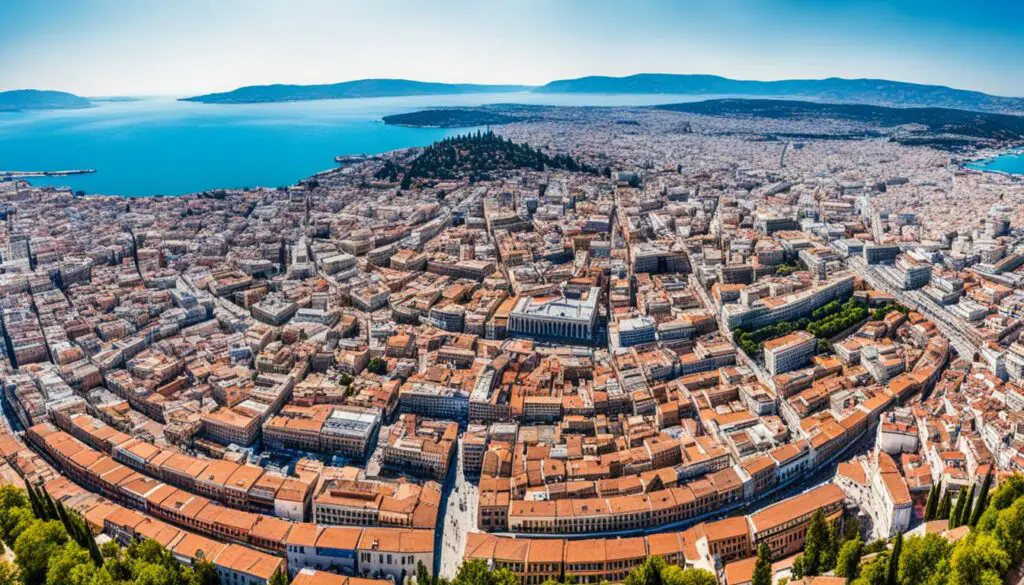
Notable Theological Themes in Thessalonica:
- Importance of faith in Christ
- The significance of love and community
- The hope of resurrection and eternal life
- Eschatological implications and the second coming of Jesus Christ
These theological themes form the foundation of the early Christian church in Thessalonica and continue to shape Christian theology and practice today.
Key Biblical Events in Thessalonica
Thessalonica holds great importance in biblical history due to its association with key events mentioned in the New Testament. One of the significant events is the establishment of the early Christian church by the Apostle Paul. Paul’s preaching and teachings in Thessalonica resulted in the conversion of many Gentiles, leading to the spread of Christianity in the region.
The letters of Paul to the Thessalonians provide further insights into the challenges faced by the early Christian community in Thessalonica and their unwavering faith in the face of persecution. These letters offer valuable teachings and guidance, addressing various aspects of Christian living and eschatological themes.
“For you, brothers, became imitators of the churches of God in Christ Jesus that are in Judea. For you suffered the same things from your own countrymen as they did from the Jews…” – 1 Thessalonians 2:14
In Thessalonica, the early Christians encountered opposition and hostility from both their countrymen and the Jewish community. Despite facing persecution, they remained steadfast in their beliefs and continued to spread the message of Christ.
These key biblical events highlight the transformative power of the gospel in Thessalonica and the faithfulness of the early Christian community in the face of adversity.
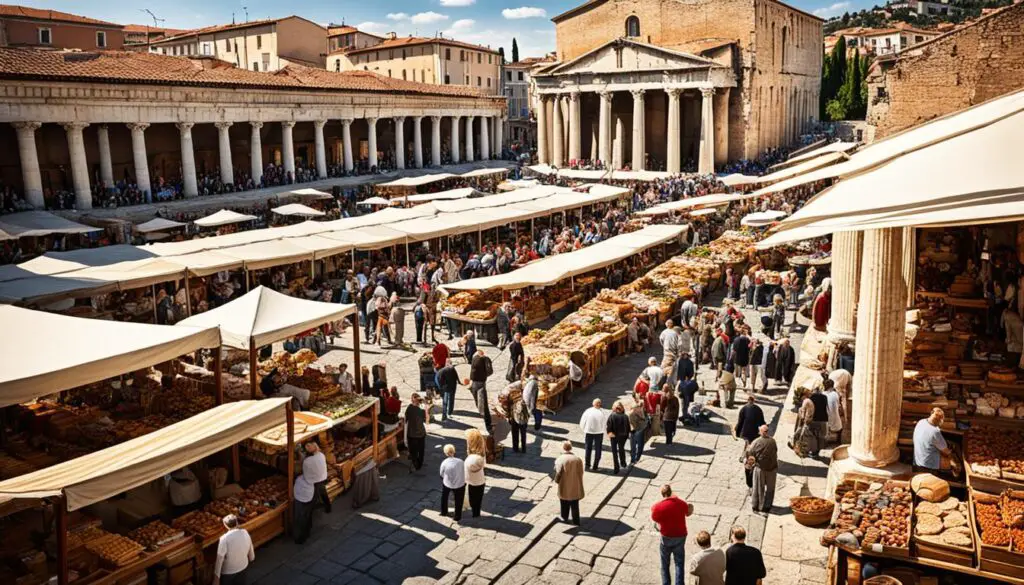
| Event | Description |
|---|---|
| Establishment of the early Christian church | Apostle Paul’s preaching and teachings lead to the conversion of many Gentiles and the spread of Christianity in Thessalonica. |
| Challenges faced by the early Christian community | Paul’s letters to the Thessalonians provide insights into the persecution and hardships faced by the early Christians in Thessalonica. |
| Unwavering faith in the midst of persecution | The early Christian community in Thessalonica remained steadfast in their beliefs and continued to spread the message of Christ despite facing opposition. |
Cultural and Religious Practices in Thessalonica
Thessalonica, a vibrant city in ancient times, was a melting pot of cultures and religions. Influenced by Greek, Roman, and Jewish traditions, the inhabitants of Thessalonica practiced a diverse array of religious and cultural customs.
The veneration of Greek and Roman gods was prevalent in Thessalonica. The residents believed in and worshiped various deities, such as Zeus, Apollo, and Aphrodite. Temples dedicated to these gods stood as prominent landmarks in the city’s landscape.
Jewish customs also played a significant role in the religious practices of Thessalonica. The Jewish community observed religious festivals, such as Passover and Hanukkah, and followed the laws and traditions outlined in the Torah.
The establishment of the early Christian church in Thessalonica brought about a profound transformation in cultural practices. Followers of Jesus Christ embraced a new faith and dedicated themselves to the teachings of the apostles.
This shift from traditional religious practices to Christianity had a profound impact on the cultural fabric of Thessalonica. Believers in Jesus Christ gathered in churches to worship, study scriptures, and partake in the sacraments. The teachings of the early Christian church in Thessalonica emphasized love, compassion, and a moral way of life.
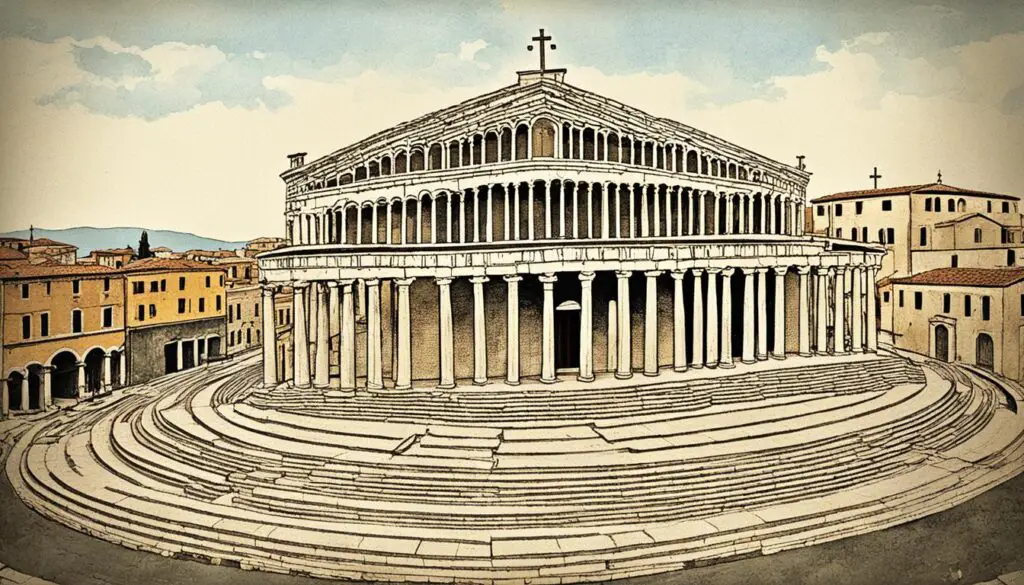
The interaction of different cultural and religious practices in Thessalonica created a unique blend of traditions, beliefs, and values. This fusion of diverse influences formed the backdrop for the historical and biblical significance of Thessalonica, shaping its identity as a city of rich cultural heritage.
Prophetic and Eschatological Significance of Thessalonica
Thessalonica holds a significant place in biblical literature due to its prophetic and eschatological significance. The teachings of the Apostle Paul in Thessalonica encompassed various future events, including the highly anticipated second coming of Jesus Christ and the resurrection of the dead. These profound teachings provided guidance and assurance to the Thessalonian believers, who were eager to understand and prepare for these momentous events.
Paul’s letters to the Thessalonians shed light on the theological importance of Thessalonica in relation to future biblical events. The believers in Thessalonica had questions and concerns about the second coming and the fate of those who had already died. In response, Paul addressed their inquiries with love and conviction, emphasizing the hope and encouragement they should hold onto in anticipation of these divine occurrences.
“For the Lord himself will come down from heaven, with a loud command, with the voice of the archangel and with the trumpet call of God, and the dead in Christ will rise first. After that, we who are still alive and are left will be caught up together with them in the clouds to meet the Lord in the air. And so we will be with the Lord forever.”
1 Thessalonians 4:16-17 (NIV)
The connection between Thessalonica and these prophetic and eschatological themes adds a deeper layer of significance to the city’s biblical history. Thessalonica continues to captivate theologians and scholars, who diligently study and interpret these teachings to gain a better understanding of the future events prophesied in the Bible.
Image:
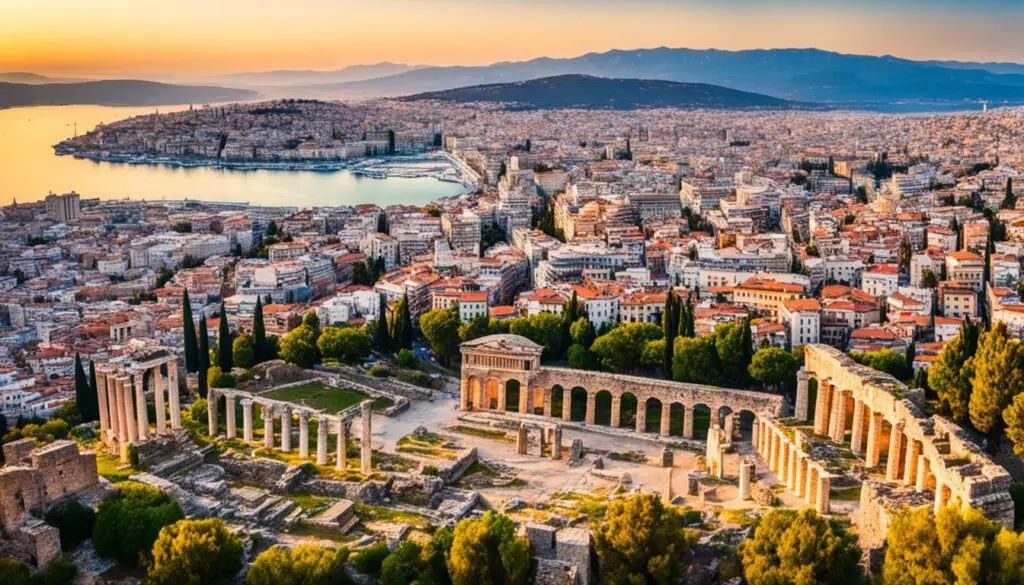
Conclusion
Thessalonica, a city of immense historical and biblical significance, has left an enduring impact on the world. Its association with Apostle Paul, who played a pivotal role in the establishment of the early Christian church, makes it an important location in biblical history. The city’s strategic geographical location, archaeological discoveries, theological themes, key biblical events, cultural practices, and prophetic significance all contribute to its rich legacy.
Thessalonica’s historical journey can be traced back to the classical period, with mentions in ancient writings under various names. Throughout the Roman and Byzantine periods, it maintained its importance as a political, military, and commercial center. The city’s geographical location on a hill, overlooking the Thermaic Gulf, made it a strategic trading hub, well-connected to other major cities through the Via Egnatia highway.
The archaeological discoveries in Thessalonica have provided valuable insights into its ancient past. Structures such as the Roman Forum, the Rotunda, and the Arch of Galerius, as well as early Christian churches, offer a glimpse into the city’s rich history. Thessalonica’s cultural and religious practices, influenced by Greek, Roman, and Jewish traditions, underwent a transformation with the establishment of the early Christian church, marking a significant shift in societal dynamics.
Thessalonica’s prophetic and eschatological significance, as addressed in Apostle Paul’s teachings, adds a deeper layer to its biblical importance. Paul’s letters to the Thessalonians provide guidance and assurance on future events, including the second coming of Jesus Christ and the resurrection of the dead. The theological depth of Thessalonica continues to be explored and studied by scholars, offering insights into the early spread of Christianity and its impact on the ancient world.


